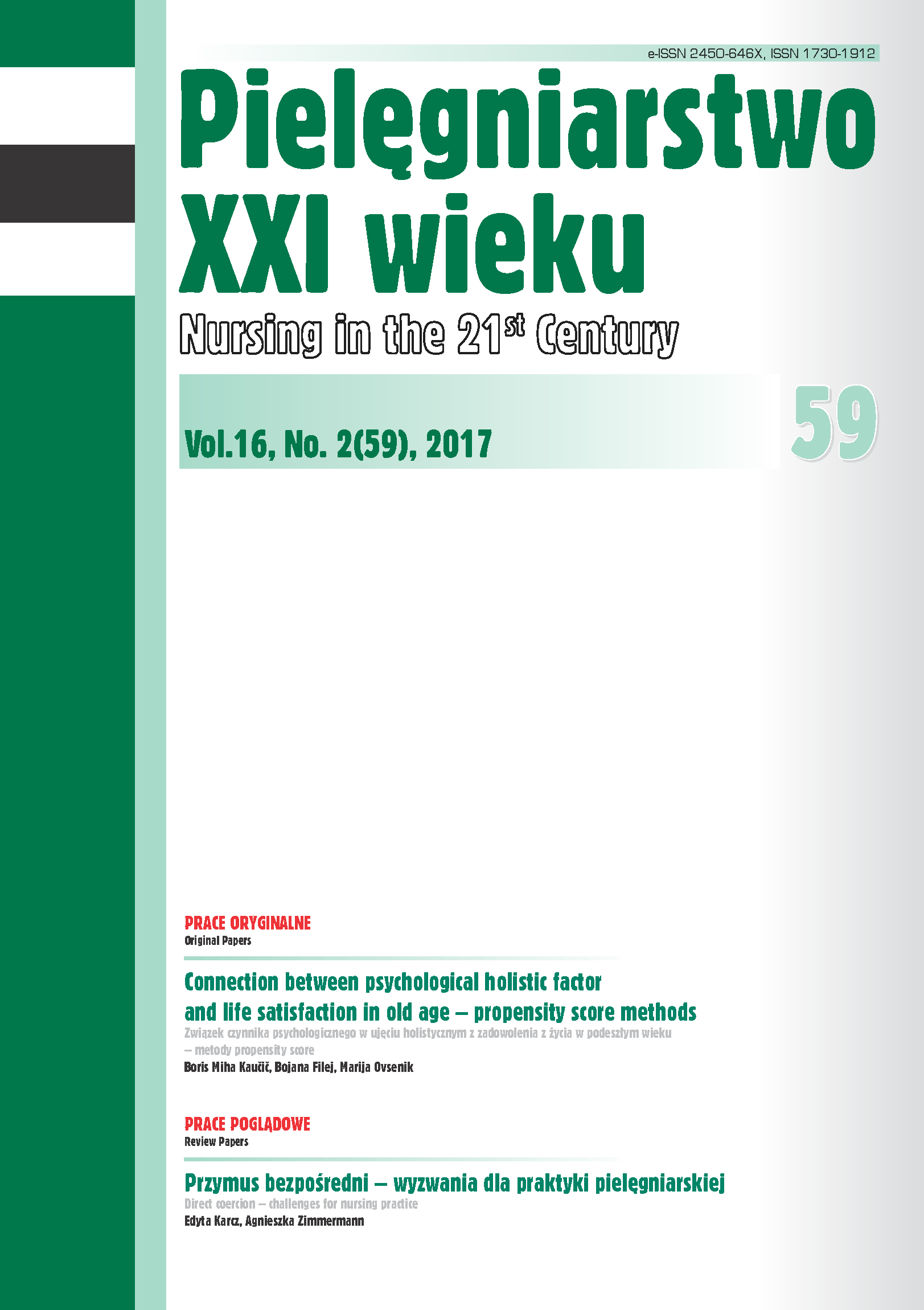Sleep disorders as a common social problem - selected determinants and health consequences
DOI:
https://doi.org/10.1515/pielxxiw-2017-0019Keywords:
sleep disorders, sleep duration, overweight, obesity, literature reviewAbstract
SLEEP DISORDERS AS A COMMON SOCIAL PROBLEM - SELECTED DETERMINANTS AND HEALTH CONSEQUENCES
Aim. The aim of the study was to analyze determinants of the sleep disorders in adults and their health consequences based on the literature review.
Material and methods. The method of systematic analysis of literature was applied for the study. The literature review by keywords was based on the data from the Google Scholar web search databases, EBSCO Discovery Service (EDS) search engines, Arianta scientific and industry journals, and information from the years 2010-2017 available on the website.
Results. Poor quality of sleep and too few sleep hours can be both a consequence and a cause of overweight and obesity. Such phenomena cause adverse changes in the endocrine system - in the form of hormonal imbalance affecting appetite, blood glucose level and the development of insulin resistance, what in turn, leads to disease development. It is, therefore, necessary to educate patients about proper sleep hygiene, reducing excessive body weight and developing healthy eating habits.
Conclusions. There is a relationship between sleep disorders together with eating disorders and somatic diseases. Sleep disorders can predispose to obesity, adversely affect the carbohydrate balance, causing increased insulin resistance and increased chance of developing type 2 diabetes, as well as numerous cardiovascular diseases.
References
1. http://www.precisionnutrition.com/all-about-sleep [Dostęp: 2017-01-24].
2. Hajduk A. Subiektywna jakość snu u chorych na toczeń rumieniowaty układowy. Praca doktorska. Gdański Uniwersytet Medyczny. Gdańsk; 2015.
3. Cieślik-Guerra U. Zaburzenia snu jako czynnik ryzyka cukrzycy typu 2. Fam Med Prim Care Rev. 2009; 11(3): 574-576.
4. Pierre M. The role of sleep duration in the regulation of energy balance: effects on energy intakes and expenditure. Clin Sleep Med. 2013; 9(1): 73-80.
5. Kasperczyk J, Jośko J. Ocena rozpowszechnienia i uwarunkowań zaburzeń snu u pracowników zmianowych. Med. Prakt. 2012; 63(5): 573-583.
6. Jarosz M, Sajór I. Czas trwania snu a nadwaga i otyłość. Żyw. Człow. Metab. 2011; XXXVII(5): 313-325.
7. Skalski M. Sen i jego zaburzenia. Przew Lek. 2003; 6(3): 128-133.
8. Frydrych-Szymonik A, Augustyn G, Szyguła Z. Znaczenie snu i sposoby poprawy jego jakości u sportowców. Journal of Education, Health and Sport. 2016; 6(5): 157-176.
9. Skalski M. Zaburzenia snu w codziennej praktyce. MedTrib Polska. Warszawa. 2012. ISBN 978-83-62597-67-3.
10. Woźniak K, Pietrzak J, Grzanka-Tykwińska A, i et al. Długość snu a ryzyko sercowonaczyniowe. Czyn. Ryz. 2012; 3: 50-55.
11. Prejbisz A, Kabat M, Kluk M, Januszewicz A. Zaburzenia snu a nadciśnienie tętnicze. Nadciśn Tętn. 2010; 14(5): 411-419.
12. Wichniak A. Psychiatria. Podręcznik dla studentów medycyny. Warszawa:Edra Urban & Partner; 2011: 289-213.
13. Wojtas A, Ciszewski S. Epidemiologia bezsenności. Psychiatria. 2011; 3: 79-83.
14. Kuźmińska M, Marcinkowska-Suchowierska E. Otyłość a obturacyjny bezdech senny. Post Nauk Med. 2013; 5b: 9-13.
15. Kapała A. Zaburzenia snu w kontekście przemian cywilizacyjnych. Sztuka Leczenia. 2014; 3-4: 35-44.
16. Cizza G, Marincola P, Mattingly M, et al. Treatment of obesity with extension of sleep duration: a randomized, prospective, controlled trial. Clin Trials. 2010; 7(3): 274-285.
17. https://podyplomie.pl/diabetologia/24063,wplyw-zaburzen-snu-na-gospodarkeweglowodanowa-otylosc-i-choroby-ukladu-krazenia [Dostęp: 2017-03-19].
18. Knutson K, Galli G, Zhao X, et al. No association between leptin levels and sleep duration or quality in obese adults. Obesity (Silver Spring). 2011; 19(12): 2433-2435.
19. Lau K, Piórkowska K, Marcinkowska U, Jaśko-Ochojska J. Senność dzienna oraz jakość snu u osób z nadwagą i otyłością. Endokrynologia, Otyłość i ZabPrzem Mat. 2013; 9(1): 1-7.
20. http://americannutritionassociation.org/newsletter/eat-your-way-better-sleep [Dostęp: 2017-01-24].
21. http://dietetycy.org.pl/zaburzenia-odzywiania-otylosci/ [Dostęp: 2017-01-24].
22. Zawilska J, Santorek-Strumiłło E, Kuna P. Nocne zaburzenia jedzenia – obraz kliniczny i leczenie. Prz Lek. 2010; 67(7): 536-540.
23. Jakuszkowiak K, Cubała W. Zespół jedzenia nocnego – rozpowszechnienie, diagnoza i leczenie. Psychiatr. 2004; 1(2): 107-111.
24. http://linemed.pl/nhealth_guide/details/cld,23,id,1204 [Dostęp: 2017-01-24].
25. https://www.ncbi.nlm.nih.gov/pmc/articles/PMC2945843/ [Dostęp: 2017-01-24].
26. https://www.sleepassociation.org/patients-general-public/sleep-eating/ [Dostęp: 2017-01-24].
Downloads
Published
Issue
Section
License
Copyright (c) 2017 Authors

This work is licensed under a Creative Commons Attribution-NonCommercial-NoDerivatives 3.0 Unported License.




